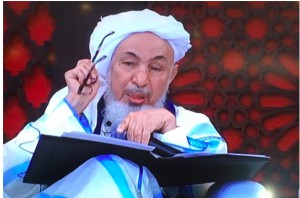TOLERANCE & SOLIDARITY .
A press release by Religions for Peace, Marrkesh, 27 January 2016
At the invitation of His Majesty King Mohammed VI, 250 of the world’s eminent Islamic leaders convened to discuss the rights of religious minorities and the obligation to protect them in Muslim majority states.

Shaykh Abdullah bin Bayyah, President, Forum for Promoting Peace and Co-Moderator, Religions for Peace, addressing the gathering
This position has historic roots dating to the time of Prophet Mohammed and the Medina Charter. Today’s Declaration was issued at a time of heightened social hostility fueled by violent extremism, widespread Islamophobia and the denial of rights, sometimes justified by misrepresentations of Islamic teachings.
The conference was organized by the Moroccan Ministry of Religious Endowments and Islamic Affairs and the Forum for Promoting Peace in Muslim Societies based in Abu Dhabi. His Eminence Shaykh Abdullah bin Bayyah, the President of the Forum for Promoting Peace and Co-Moderator of Religions for Peace (RfP), offered the keynote address that set the framework for deliberation among the Islamic leaders. Fifty senior leaders from the world’s diverse religious traditions other than Islam were invited as observers of the Islamic deliberations.
A summary of the Marrakesh Declaration includes:
• “The objectives of the Charter of Medina provide a suitable framework for national constitutions in countries with Muslim majorities, and are in harmony with the United Nations Charter and related documents, such as the Universal Declaration of Human Rights.”
• “Affirm[s] that it is impermissible to employ religion for the purpose of detracting from the rights of religious minorities in Muslim countries.”
• “Call[s] upon representatives of the various religions, sects and denominations to confront all forms of religious bigotry, vilification and denigration of what people hold sacred, as well as all words that promote hatred and racism.”
The fifty religious leaders other than Muslims:
• Expressed their gratitude to the Islamic leaders for their unflinching courage and devotion to their tradition and for welcoming non-Muslims among them as observers;
• Affirmed values shared with the Islamic leaders;
• Asked forgiveness for past and current injuries for which their communities are complicit;
• Shared particular concerns over violence in the name of religion, limitations of citizenship, restrictions on freedom of religion or belief, and xenophobia, especially Islamophobia;
• Committed to follow-up work in solidarity with Muslim brothers and sisters to build a culture of peace; and,
• Respectfully expressed the hope that this convening of Islamic leaders will be continued by future regional conferences.
Every attack, every hate crime, every insult, every humiliation is amplified in the media and sends out a polarizing wave, fueling the rise in hostility. Only religious communities cooperating — standing shoulder-to-shoulder in solidarity — can transform this vicious cycle into a virtuous one, in which the good deeds of each community call out to and reinforce the good deeds of the others. RfP is committed to supporting all religious communities in collaborative efforts to build a virtuous cycle for Peace.
Read the Marrakesh Declaration Summary in Arabic Here.
Read the Marrakesh Declaration Summary in English Here
Question related to this article:
How can different faiths work together for understanding and harmony?
This discussion question applies to the following articles:
Creating Harmony in the World: Working through Our Faiths in Dialogue
Alternate Focus: Balance in Media Coverage in Middle East
The Parliament of the World's Religions (Barcelona, Spain)
Asian Religious Leaders Urge Religions To Teach Peace
Living Faiths Together – Tool kit on inter-religious dialogue in youth work
Sharing the right to Jerusalem's past
The Doha Pre-Forum of the United Nations Alliance of Civilizations
Peace For Childrens in Primary Schools in Iraq
Dialogue in Nigeria — a new DVD teaching-tool for peacemakers
4th Annual International Conference on Religion, Conflict and Peace
First Religious Youth Service Project in Pakistan
World Harmony Day at the UN Highlights the Culture of Peace
Report of Diversity Talk Series 2013, in Lahore, Pakistan
Journée d'étude à Tunis: Religions et cultures au service de la paix
Workshop in Tunis: Religions and cultures in the service of peace
Out of the spotlight, Moroccan Islamic party promotes interfaith dialogue
Muslim and Christian youth come together in Mombasa, Kenya
Greeting of Peace from United Social Welfare Society, Pakistan
Interfaith Cultural Study Tour to Nepal: Pakistan Youth Explore the Mysteries of Nepal
One Nation, One Blood (Pakistan)
Teachings of Peace
Overview of the Book, Paganism an Introduction to Earth-Centered Religions
La líder de un movimiento interreligioso Dena Merriam recibirá el 31 Niwano Peace Prize
Dena Merriam, Founder and leader of The Global Peace Initiative of Women to receive the Niwano Peace Prize
Pakistan: Scholars adopt charter of peace, support coexistence
Lebanese dialogue aims to strengthen unity in diversity
Un an du “Projet Revalorisation du Vivre Ensemble – REVE” au Niger
A Year-long Project for “Living Together – REVE” in Niger
Beating the drum for peace: A chat with the general secretary of the South Sudan Council of Churches